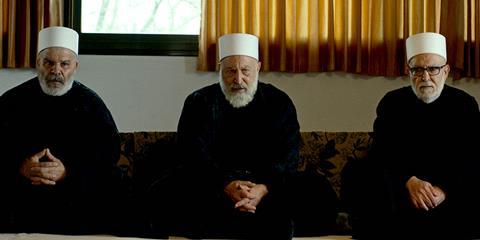A Druze community between Syria and Israel is the setting for Ehab Tarabieh’s fiction debut

Dir: Ehab Tarabieh. Israel/Germany. 2022. 83mins
A small community in the turbulent Golan Heights region, caught between Syria and Israel, is riven with political and personal tensions as past secrets impinge on the present in this slow-burn drama. The idea of the cyclical nature of experiences is underlined by its setting in the Druze community, a monotheistic religion incorporating elements of Islam, other Abrahamic and eastern faiths and Greek philosophy. The unusual backdrop of The Taste of Apples is Red, which premiered in Toronto, should prove a further selling point for festivals after it screens at Thessaloniki and Marrakech this autumn, and could see it attract art house audiences in the future.
Central performances elevate its punch
This community believes there is a finite number of souls, who are reincarnated in balance, so that when a Druze dies, their soul is immediately transported to a newborn. The recollection of past lives is a fundamental part of this belief and, in the opening moments, we see a young boy telling Sheikh Kamel (Makram J Khoury) about the horrors of committing war crimes in his previous incarnation as a soldier for the Syrian regime of Bashar al-Assad. This is a theme that director Ehab Tarabieh and his co-writer Sol Goodman pointedly return to via another character later; it’s the sins of those who do not confess, however, which will drive the narrative.
Sheikh Kamel finds his own family’s past is not dead and buried either when his long-exiled brother Mustafa (Tarik Kopty, in his final role before his death in February) collapses injured on his doorstep, leaving him with little option but to take him in. The sheikh enlists the help of his daughter Salma (Rula Blal), who acts as the local midwife, to nurse Mustafa in the hopes of getting him back on his feet before the rest of the community find out courtesy of Syrian-favouring local Daud (Suheil Haddad), as truths about the past begin to emerge.
Tarabieh has a background in documentary, including Of Land And Bread, 2019’s vignette-driven consideration of Palestinian life, and for the most part he and his cinematographer Yaniv Linton – who also has a documentary-dominated CV – take a straightforward approach. Their measured shooting style, involving lingering takes and slow pans is, however, punctuated by a moment of fable-like horror that could have bled in from a genre film and which could prove too much for some audiences. The scene brings the balance of life and death shockingly home via an act of violence – suggested more by the gut-flipping sound design from Yossi Applebaum than visuals – and will likely mean you are never able to look at a goat in the same benign light again.
These more primal elements, though welcome in what is otherwise a very traditional story arc, jostle for attention with the film’s more political themes, which may well leave viewers longing for more context regarding the region’s position between Syria and Israel. The central performances, however, elevate its punch. Koury lets the moral conflict he feels betray itself in almost every twitch of his face, while Kopty imbues Mustafa with a soulful vulnerability and Haddad brings veiled threat to Daud.
Meanwhile the quivering state of a community caught between serving multiple masters as an act of self-preservation is emphasised by the scoring from Anne de Boysson, which rests upon tremulous strings. Tarabieh suggests that maintaining balance can be a fraught rather than a peaceful act, and that balance does not necessarily equal harmony.
Production companies: Anemos Productions
International sales: Match Factory sales@matchfactory.de
Producers: Jonathan Doweck, Sol Goodman
Screenplay: Ehab Tarabieh, Sol Goodman
Cinematography: Yaniv Linton
Production design: Rabia Salifiti
Editing: Ori Derdikman
Music: Anne de Boysson
Main cast: Makram J Khoury, Tarik Kopty, Rula Blal, Suheil Haddad
























